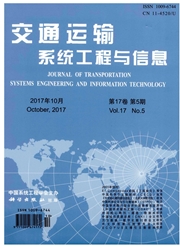

 中文摘要:
中文摘要:
家庭中普遍存在陪伴和互助等联合决策行为,但既有研究多数以个体为决策单元,以效用最大化为建模基础,忽视了出行者作为“社会人”的非理性特质及家庭内部存在着成员交互的自组织特性.本文在时空制约的基础上,强调社会关系对个体行为的影响,提出统合时间地理学和社会网络理论对群体组织下的个体行为进行研究.通过构建个体在家庭中的角色度量指标,得到典型的家庭关系网络交互模式,并基于交互行为显著的关系模式建立结构方程模型,验证了基于社会网络理论的家庭活动—出行的分析方法.结果表明,个体因活动需求而受到的外部时空制约并非直接作用于成员个体,而是通过家庭内部关系网得以均衡化,处于低制约位的角色会明显协助高制约位的角色,且前者在家庭资源分配中具有优先权.在家庭活动安排和资源分配中,考虑家庭结构因素的关系网络更有助于对“社会个体”活动—出行行为的全面理解.
 英文摘要:
英文摘要:
The joint decision-making behaviors such as companion, substitution, complementary exist generally in family activities. However, ignoring the irrational characteristics of traveler as a society and the self-organization characteristics of interactions between family members, most studies on travel behavior take individual as decision-making unit and model based on the utility theory ofmicroeconomics. On the basis of time and space constraints, this paper emphasizes the influence of the social relationship to individual behavior, integrates time geography and social network theory of study to individual. Firstly, a role-measured indicator is put forward to reflect the position of individual in family network structure, and we obtain the typical household interaction modes and their characteristics. After that, a SEM of individual activity-travel choice is constructed based on obviously interaction network of family relationships. In conclusion, the external constraints of individual for participating activities not have a directly effect on individual' s own, but balanced through internal network relationship of family, the low-restrict member role who has a higher-priority of household resources would like to help the high-restrict member role. Especially, considering family structure is not only benefit a refined model, but also help a good understand for model, which ultimately realizes the full appreciation for individual' s activity-travel behavior.
 同期刊论文项目
同期刊论文项目
 同项目期刊论文
同项目期刊论文
 期刊信息
期刊信息
